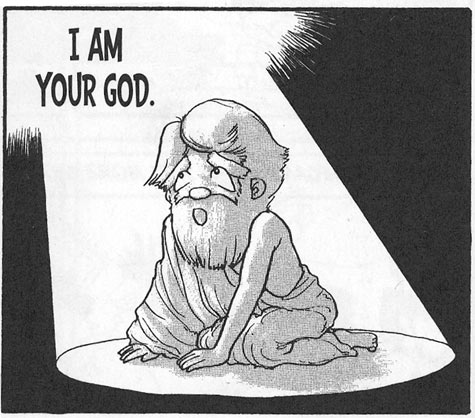
Panel from The Manga Bible |
Young Laurel Templeton spends her summer vacation “kidnapped by five cyborg flies and shrunk down to insect size so [she can] travel back in time with them to save the world from an evil spider.” You know, typical stuff.
A manga comic character and the star of the new TimeFlyz series, Laurel may be just an average girl, but she has a centuries-old, ancient-Hebrew-speaking friend with whom she can’t communicate, and a Nobel Prize–winning father who has been kidnapped by a deranged arachnid named Darchon. By the end of Pyramid Peril, the first installment of her story, she’s vowed to assist the cyborg flies in defeating Darchon and rescuing her father.
“They say, ‘From those to whom much is given, much is expected,’ ” Laurel realizes toward the end of TimeFlyz, Volume One. Although she thinks it’s a line from one of her little brother’s poems, that axiom is actually from the Bible — Luke, 12:48.
Yup, Bible verses are now being tossed around nonchalantly in a comic book. Laurel’s character is the most recent attempt by Zondervan — the Christian division of HarperCollins, which, with sales topping $1 billion this past year, is one of the biggest publishing houses in the world — to get . . . er, hip to what today’s kids are digging.
As opposed to other series in Zondervan’s new Z Graphic Novel line, introduced in August, there’s nothing explicitly religious about TimeFlyz; it’s just good, clean, moral fun — material that Christian bookstores can feel comfortable putting on their shelves, and that Christian parents can feel satisfied purchasing.
And yet the TimeFlyz series is being drawn in the popular Japanese manga style, a style that even a Zondervan-issued FAQ describes as one that “tend[s] to celebrate violence and sexual misbehavior.” That may seem a bit counterintuitive for a religious graphic novel, given the anti-pop-culture emphasis that pervades much of the Christian movement. After all, there’s not much about secular pop culture that can get by the Christian value-meter.
Take James Dobson, chairman of Focus on the Family, who says of the Harry Potter phenomenon: “We have spoken out strongly against all of the Harry Potter products.” The Focus on the Family Web site goes on to say that “Magical characters — witches, wizards, ghosts, goblins, werewolves, poltergeists, and so on — fill the Harry Potter stories, and given the trend toward witchcraft and New Age ideology in the larger culture, it’s difficult to ignore the effects such stories [albeit imaginary] might have on young, impressionable minds.”
Curiously, though, Zondervan has apparently deemed robotic flies that can travel through time to be cool — not devilish. So amid evangelicals railing in the mainstream media against Harry Potter and pop music as corrupting morality (remember, rock is the Devil’s music), Zondervan is quietly expanding on Christian efforts to adapt pop culture to evangelical ends. Like putting rock bands with drum kits next to the altar, or video screens above the pews, Christian graphic novels suggest a compromise approach: if you can’t beat ’em, join ’em — and do some proselytizing while you’re at it. In other words, a little fantasy is okay, as long as it’s morally stamped and approved.